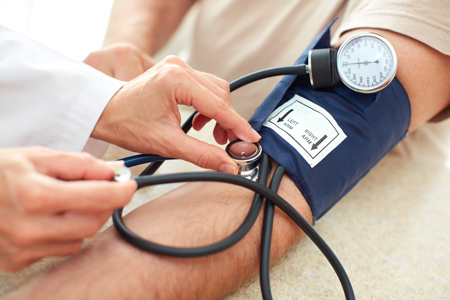NAD Precursor May Improve Cardiovascular Health
 NAD, or nicotinamide adenine dinucleotide, is found in all living cells. Its oxidized form, NAD+, rose in popularity as a nutritional supplement following a 2013 Harvard study that suggested it might slow aging in mice. A 2018 article by researcher Christopher R. Martens and colleagues in the journal Nature Communications reports that a precursor vitamin to NAD+ called nicotinamide riboside (NR) can stimulate NAD+ metabolism in healthy middle-aged and older adults compared to placebo, which might improve cardiovascular health. In the crossover study, participants received NR or placebo for six weeks, and then received the other option for a second six-week period. NR was associated with increased NAD+ metabolism.
NAD, or nicotinamide adenine dinucleotide, is found in all living cells. Its oxidized form, NAD+, rose in popularity as a nutritional supplement following a 2013 Harvard study that suggested it might slow aging in mice. A 2018 article by researcher Christopher R. Martens and colleagues in the journal Nature Communications reports that a precursor vitamin to NAD+ called nicotinamide riboside (NR) can stimulate NAD+ metabolism in healthy middle-aged and older adults compared to placebo, which might improve cardiovascular health. In the crossover study, participants received NR or placebo for six weeks, and then received the other option for a second six-week period. NR was associated with increased NAD+ metabolism.
The researchers suggest that more research is needed to investigate whether chronic NR supplementation might be able to reduce blood pressure and arterial stiffness.
High Blood Pressure is a Marker of Good Response to Prazosin in PTSD
Prazosin, an alpha-1 adrenoreceptor antagonist, has been found to be effective at reducing symptoms of post-traumatic stress disorder (PTSD), including nightmares. Researchers led by Murray Raskind hypothesized that there may be a link between blood pressure and response to prazosin, since resting blood pressure can be used to measure alpha-1 adrenoreceptor responsiveness. In a study of active duty combat soldiers with PTSD, higher resting blood pressure and smaller drop in blood pressure when going from lying down to standing up predicted a better response to prazosin.
The researchers believe that blood pressure can be used to estimate the central nervous systems’s responsiveness to norepinephrine, which prazosin blocks. In patients with PTSD who received placebo instead of prazosin, blood pressure did not predict improvement. Raskind and colleagues hope to be better able to predict response to prazosin in PTSD by measuring patients’ baseline blood pressure.
Prazosin Effective for Nightmares and Other PTSD Symptoms
Researcher Murray Raskind has conducted a series of controlled studies, all with the same conclusion—the alpha-1 antagonist prazosin, used to treat high blood pressure, works for post-traumatic stress disorder (PTSD), especially in preventing nightmares. In his latest study, 67 soldiers were randomly assigned to either prazosin or placebo for 15 weeks. Doses were slowly titrated (to avoid low blood pressure and dizziness) to a possible maximum dose of 5mg at midmorning and 20mg at bedtime for men and 2mg at midmorning and 10mg at bedtime for women over a period of 6 weeks, based on whether the patients continued to experience nightmares.
Raskind found that prazosin was effective for trauma nightmares, sleep quality, global functioning, total score on a scale of PTSD symptoms, and hyperarousal. Side effects were minimal. Raskin concluded that prazosin “is effective for combat-related PTSD with trauma nightmares in active-duty soldiers, and benefits are clinically meaningful.”
Keep Your Heart and Cardiovascular System Healthy
 Middle aged folks, watch your risk factors for cardiovascular disease. These include: high blood pressure, cholesterol, weight, and blood sugar (diabetes).
Middle aged folks, watch your risk factors for cardiovascular disease. These include: high blood pressure, cholesterol, weight, and blood sugar (diabetes).
According to Heartwire, an article in the New England Journal of Medicine indicates that having any of these risk factors increases the likelihood of cardiovascular disease later in life. The more risk factors one has, the greater the increase in risk.
Across the whole meta-analysis, participants with no risk factors at age 55 (total cholesterol level: <180 mg/dL;
blood pressure: <120 mm Hg systolic and 80 mm Hg diastolic; nonsmoking; nondiabetic) had drastically better odds
of avoiding death from cardiovascular disease through the age of 80 than participants with two or more major risk
factors (4.7% vs 29.6% among men and 6.4% vs 20.5% among women).People with an optimal risk-factor profile also had lower lifetime risks of fatal coronary heart disease or nonfatal MI (Editor’s Note: myocardial infarction, or heart attack) (3.6% vs 37.5% among men, <1% vs 18.3% among women) and fatal or nonfatal stroke (2.3% vs 8.3% among men,
5.3% vs 10.7% among women), compared with those with two or more risk factors.
What this article does not mention is that depression is a risk factor for coronary artery disease, and should be treated just as aggressively and persistently as the other cardiovascular risk factors.
Also as we’ve written before in the BNN, exercise is one element of a healthy life style that can positively affect all of these risk factors. Starting a healthy diet and exercise regimen in middle age will have long-term positive effects and reduce risks later in life.



